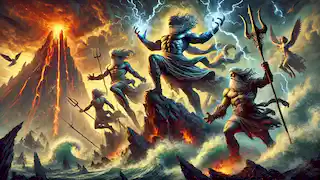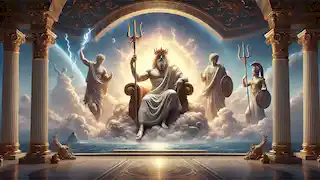In the age before gods and mortals, when the earth was still a formless expanse, and the heavens stretched unbroken into infinity, there existed the primal forces of creation. From the chaos of this void emerged Gaia, the embodiment of the earth, and Uranus, the vast expanse of the sky. Their union gave birth to the Titans, mighty deities who embodied the untamed essence of existence itself. This tale is one of their rise to power, their golden age, and their eventual downfall—a story of ambition, betrayal, and the unrelenting hand of fate. Gaia, mother of all things, longed to fill the empty world with her children. She joined with Uranus, and their union brought forth the first generation of Titans: six males—Cronus, Oceanus, Hyperion, Iapetus, Coeus, and Crius—and six females—Theia, Rhea, Phoebe, Tethys, Mnemosyne, and Themis. These twelve Titans were embodiments of cosmic forces: the sky, sea, time, memory, justice, and more. Uranus, however, saw the strength of his children and feared their power. To maintain his supremacy, he imprisoned some of his offspring, including the monstrous Hecatoncheires and Cyclopes, deep within Tartarus, a dark abyss beneath the earth. Gaia, heartbroken by the suffering of her children, sought revenge against Uranus. Among all her children, Cronus, the youngest and most cunning, agreed to act on Gaia’s behalf. Armed with a sickle forged from adamant, Cronus lay in wait. One fateful night, as Uranus descended to embrace Gaia, Cronus struck. The sickle severed Uranus from his power, and the heavens roared with his agony. His blood fell upon the earth, giving rise to new beings, including the Furies and the Giants. Thus, the reign of the Titans began. With Uranus dethroned, Cronus became the ruler of the cosmos. He released his Titan siblings from Tartarus and shared his power, ushering in the Golden Age—a time of peace and prosperity. During this era, the world flourished under the Titans’ rule. Rivers flowed freely, forests grew thick, and mortals—created by Prometheus—lived without fear, toiling under the sun but free from death and suffering. Yet, Cronus was haunted by a prophecy uttered by Uranus in his dying breaths. It was foretold that Cronus would suffer the same fate as his father, overthrown by one of his children. Paranoia consumed him, and he vowed to prevent the prophecy from coming true. When Rhea, his sister and wife, bore him children, Cronus swallowed each one immediately after birth. Hestia, Hera, Demeter, Poseidon, and Hades—all were consumed by their father’s insatiable fear. Rhea, devastated and desperate, devised a plan to save her sixth child. When she gave birth to Zeus, she swaddled a stone in cloth and presented it to Cronus, who swallowed it without suspicion. Meanwhile, Rhea spirited Zeus away to a hidden cave on Mount Ida in Crete, where he was raised by nymphs and fed by the goat Amalthea. {{{_01}}} Zeus grew up strong and wise, his divine heritage evident in his strength and resolve. As he matured, the prophecy of Cronus’s downfall weighed heavily on him. Guided by his mother Rhea and the wisdom of Metis, a Titaness of cleverness and foresight, Zeus devised a daring plan to confront his father. Disguised as a humble servant, Zeus infiltrated Cronus’s court. Using a potion crafted by Metis, he tricked Cronus into drinking it. The potion forced Cronus to vomit up the children he had swallowed, now fully grown. Zeus was reunited with his siblings—Hestia, Hera, Demeter, Poseidon, and Hades—and together they declared war on Cronus and the Titans. Thus began the Titanomachy, a war of unimaginable scale and ferocity. The Titanomachy raged for ten years, with the earth itself bearing the scars of the conflict. On one side stood the Olympians, led by Zeus and his siblings, along with their allies, the Cyclopes and Hecatoncheires. On the other stood Cronus and the Titans, who held dominion over Mount Othrys. The Cyclopes, in gratitude for their release from Tartarus, forged mighty weapons for the Olympians. To Zeus, they gifted thunderbolts, weapons of lightning and thunder that could strike with the force of the heavens. Poseidon received a trident, capable of stirring the seas and shaking the earth. Hades was given a helm of invisibility, granting him the power to move unseen. With these gifts, the Olympians pressed their advantage. The Hecatoncheires, towering giants with a hundred arms each, hurled massive boulders, raining destruction upon the Titans. Even the mighty Cronus began to falter under the relentless onslaught. The turning point came when Zeus unleashed his thunderbolts in a storm of divine fury. Mountains crumbled, rivers boiled, and the earth quaked. One by one, the Titans fell, their power extinguished by the younger gods. Cronus, defeated and broken, was cast into Tartarus alongside his loyal followers. Only a few Titans, such as Prometheus and Themis, who had aided Zeus, were spared this fate. With the Titans defeated, the Olympians claimed their place as the new rulers of the cosmos. Zeus, as the leader, divided the realms among his siblings: Poseidon took the seas, Hades the underworld, and Zeus the heavens. The earth was left as a shared domain. Despite their victory, the Olympians faced challenges in establishing their rule. Prometheus, who had supported Zeus during the war, became a pivotal figure in shaping the world of mortals. He gifted humanity with fire, defying Zeus’s decree and sparking a series of conflicts that would shape future myths. Tartarus became the eternal prison of the Titans, their immense power sealed away. However, their influence endured. The lessons of their rise and fall remained a warning about the cyclical nature of power and the dangers of unchecked ambition. The tale of the Titans is one of grandeur and tragedy. It speaks to the impermanence of power and the relentless march of time, themes that resonate across all eras. Though their reign has ended, the Titans’ legacy lives on in the stories, shaping the identity of the gods and mortals alike. As the stars continue to shine in the heavens, they remind us of an age when the Titans walked the earth—a testament to the enduring power of myth and the eternal dance between creation and destruction.The Creation of the Titans
The Reign of Cronus
Zeus’s Cunning Plan

The Titanomachy

The Aftermath of Victory

Epilogue: A Legacy Beyond Time
The Tale of the Titans
Reading Time: 6 min

About Story: The Tale of the Titans is a Myth Stories from greece set in the Ancient Stories. This Dramatic Stories tale explores themes of Good vs. Evil Stories and is suitable for All Ages Stories. It offers Cultural Stories insights. An epic Greek myth of ambition, betrayal, and the rise of the gods.


















